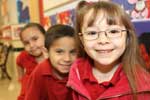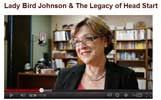Semillitas ~ Seedlings for Learning
IDRA Early Childhood Education Project


- High-quality linguistically rich educational resources,
- Support and voice for vulnerable Latino, Black and Native American children,
- Awareness of assets and needs of vulnerable children and families,
- Collaborative leadership and action in advocating for early childhood education,
- Support and professional development for teachers, parents and caregivers, and
- An online network for information and advocacy for access, excellence and equity in early childhood education.
The Semillitas ~ Seedlings for Learning project helped vulnerable children succeed by providing teachers and parents with high quality linguistically and culturally appropriate educational materials and research-based models, training and technical assistance that can be replicated elsewhere.
The project was unique in combining community-driven educational change with valuing principles about the importance of relationships, culture, language, partnerships, core assets of family strengths and every child’s ability to learn, coupled with the tools of technology. Its aim is to create networks for early learning and school readiness for vulnerable children in Texas and the southwest.
Semillitas de Aprendizaje™
The Semillitas project contributed to the development and dissemination of excellent, culturally relevant bilingual and multicultural materials: IDRA’s Semillitas de Aprendizaje™ supplemental curriculum (Big Books, Math Readers, Cartitas ~ Letters Home, teacher guide, etc.) and professional development. Semillitas de Aprendizaje™ builds capacity of teachers and parents to provide linguistically rich opportunities for children to build critical skills in literacy and numeracy and a strong self-concept.
This work built on IDRA’s success with its Reading Early for Academic Development (READ) project, funded by the U.S. Department of Education, that helped to establish Centers of Excellence based on a multicultural model. It also built on IDRA’s Amanecer, the first developmental early childhood curricula to incorporate language, culture and values of English learners (no longer in print).
This project offered professional development strategies that build cognitive and language skills associated with school readiness and success in literacy, math and social-emotional competencies. The educational materials and lesson plans in the teacher guide incorporate seven learning-related skills that help children succeed now and in the future, from Mind in the Making: The Science of Early Learning by Ellen Galinsky (2010).




Principles of Effective Partnerships
The Semillitas ~ Seedlings for Learning approach to home-school partnerships, contained in IDRA’s Quality Schools Action Framework and reflected in our seven-part Community Engagement Series for Educators, adheres to a valuing philosophy and incorporates the IDRA’s Six Goals of Educational Equity and the W.K. Kellogg Foundation’s Principles of Effective Partnerships. The training materials help schools and early childhood centers meaningfully engage with families as partners in the teaching and learning process. (Principles of Effective partnerships from W.K. Kellogg Foundation, “Engagement in Youth and Educational Planning,” 2002)
Effective partners…
- See their present and future well-being as inextricably linked;
- Have high expectations for their performance and involvement with one another;
- Respect the language, history, culture, knowledge and wisdom of one another;
- Value and promote diversity;
- Create structures that promote open communication, feedback and continuous improvement with one another;
- Engage in reciprocal learning; and
- Collaboratively plan and design mutually beneficial programs and outcomes.
Building a Community of Learners
A community of learners comprised of local community-based organizations, parents, practitioners and experts helps to bring rigor and expertise from research and practice in the field. The goal of the community of learners is to bring together diverse voices of parents, children, practitioners and educators to share lessons learned through technology.

